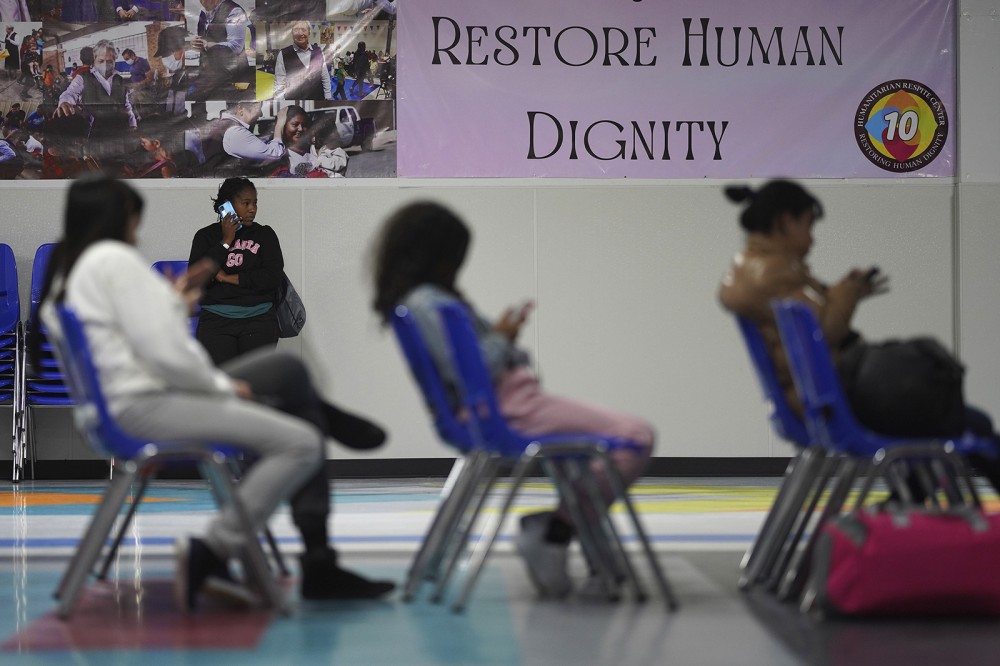Catholic bishops say they will no longer partner with US on refugee work and children's services

Migrants seeking asylum in the United States wait for humanitarian assistance and relief at Catholic Charities in McAllen, Texas, January 18. (AP Photo/Eric Gay, file)
The US Conference of Catholic Bishops announced Monday that the bishops would not seek to renew agreements with the federal government for refugee resettlement and children’s services.
The announcement comes after months of uncertainty about reimbursing Catholic agencies for their work with refugees, exacerbated in part by Vice President JD Vance’s allegation, in his first television interview as vice president in January, that the bishops’ true concern was for their “bottom line.”
A federal judge blocked the Trump administration’s suspension of the refugee resettlement program in late February, but at least a dozen local Catholic Charities agencies across the country have had to lay off hundreds of employees because the administration has not restarted payments.
A group of non-Catholic faith-based refugee resettlement agencies, including Church World Service, HIAS, and Lutheran Community Services Northwest, have had success blocking the Trump administration’s efforts to radically reshape and diminish the refugee resettlement program, as a judge found the administration’s efforts to be a “nullification of congressional will,” but the USCCB, which filed its own suit with a narrower argument seeking to stop the Trump administration from pausing or cancelling contracts the conference, has met with less success.
Calling the USCCB’s decision to give up its attempt to renew the agreements “heartbreaking,” the conference’s president, Archbishop Timothy Broglio, who leads the Archdiocese for the Military Services, USA, wrote, “While this marks a painful end to a life-sustaining partnership with our government that has spanned decades across administrations of both political parties, it offers every Catholic an opportunity to search our hearts for new ways to assist.”
“We simply cannot sustain the work on our own at current levels or in current form,” Broglio wrote, explaining that the conference would look for alternatives to support migrants already admitted to the US.
“Our efforts were acts of pastoral care and charity, generously supported by the people of God when funds received from the government did not cover the full cost,” said Broglio, pushing back on Vance’s “bottom line” accusation.
Broglio pointed out in his statement that the National Catholic War Council, the first predecessor to the USCCB, began a Bureau of Immigration just three years after the council was founded in 1917 “to help displaced families find new opportunities in the United States.” The archbishop wrote, “Many of us can trace our own parents, grandparents, or great grandparents to these very families.”
Maggie Elmore, assistant professor of history at Baylor University, who is working on a book about the history of Catholic immigration agencies, said in an interview that the bureau began cooperating with the federal government in the early 1920s “to provide services for immigrants, refugees and asylum seekers.”
“Today’s announcement is unprecedented and indicates a fractured partnership. This will take a tremendous toll on thousands of people for whom the conference provides lifesaving services,” wrote Elmore.
Elmore noted that the bishops’ Migration and Refugee Services department has faced federal funding cuts in the past under President Barack Obama’s administration because of the conference’s positions on birth control and abortion, as the administration gave “strong preference” to organizations that gave referrals for those services.
In his statement, Broglio indicated that the conference would continue to pursue immigration reform advocacy. “The Gospel’s call to do what we can for the least among us remains our guide. We ask you to join us in praying for God’s grace in finding new ways to bring hope where it is most needed,” he wrote. —Religion News Service





